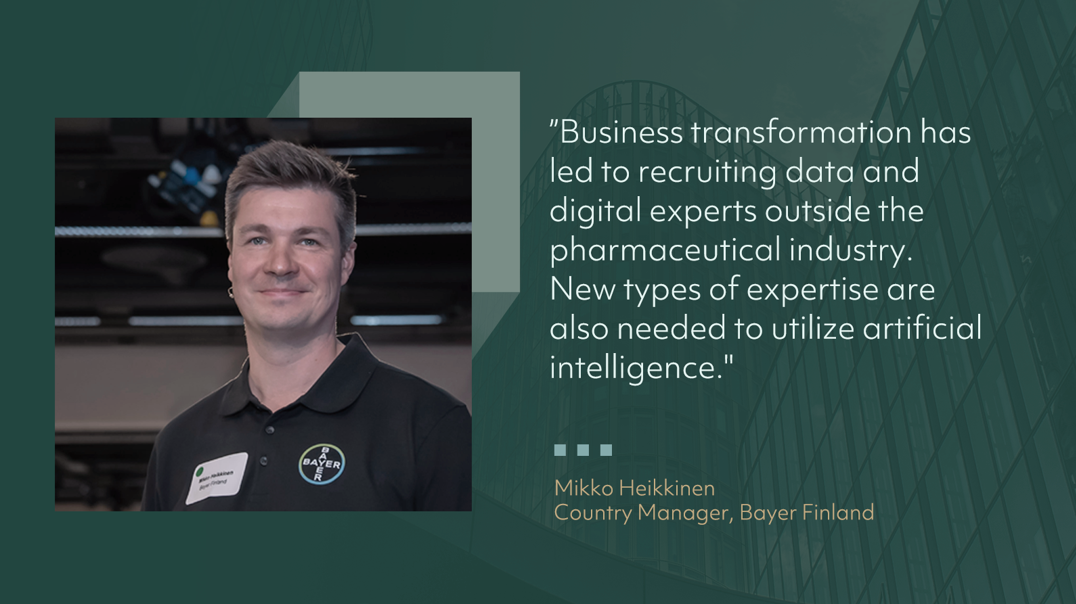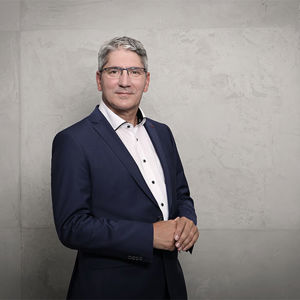The pharmaceutical industry is mainly experiencing the same trends and changes as other industries, despite its unique characteristics. In particular, the pharmaceutical sector is now seeking data experts. Data analytics and data utilization are currently the focus. According to Heikkinen, traditional roles in medicine, finance, sales, and marketing are still essential. How has leadership changed in recent years?
Mikko Heikkinen views leadership at Bayer strongly as the management of an expert organization. "At Bayer Pharma, leadership is more about enabling, which includes encouraging people and minimizing or removing potential work obstacles. Our leadership style is more 'coaching-oriented, 'and teams can make decisions. The traditional line organization is no longer relevant in our work."
At Bayer, they talk about fluid teams, where tasks change and evolve according to customer and company needs. Employees have the opportunity to use and develop their skills while transitioning into new roles and facing new opportunities. Bayer's new CEO, Bill Anderson, is behind this change program. It involves a 'dynamic shared ownership' model, where freedom and responsibility are shared among all employees.
"Our leadership role is called a VACC leader, which stands for Visionary, Architect, Coach, Catalyst. This leadership style and working allow people to thrive and bring out their best qualities," Heikkinen summarizes.
Bayer is strongly investing in research
"We have many researchers in Finland, in Espoo and Turku, and sometimes we recruit from other countries, as the expertise required in research is very specialized," says Heikkinen. Bayer's research investments are around 10-20% of revenue. Production capacity has been increased, and a larger workforce has been hired for that area. "We train our production workers ourselves for high-tech tasks," Heikkinen explains. According to Heikkinen, the goal is to bring better health to everyone worldwide.
"We are still seeking growth, and we have new product launches in addition to our current portfolio. Later in the decade, Bayer will also introduce promising gene and cell therapy treatments. These treatments will shift the focus from symptom management to addressing the causes of diseases." Promising research in these new therapies includes treatments for Parkinson's disease, heart failure, and rare diseases such as Huntington's disease. Gene and cell therapy will revolutionize patient care, health outcomes, and the healthcare system.
The most important trends and challenges facing the pharmaceutical industry
Mikko Heikkinen considers challenges related to the predictability of the operating environment to be significant today. Drug availability issues are global. Several factors, such as disruptions in global raw material and production chains and logistics, cause them. On the other hand, a sudden change in demand elsewhere may mean that limited packaging capacity is used for other countries' needs rather than Finland's. This may be the case, especially if the product's profitability in Finland is lower due to the maximum wholesale price level approved by the authorities. The planned cuts to drug wholesale prices risk their availability in Finland. "If Finland's price level is too low, in the worst-case scenario, the drug might not even be brought to Finland because of it," says Heikkinen.
/Birn+Partners Finland, Riitta Rautakoura, Executive Consultant













